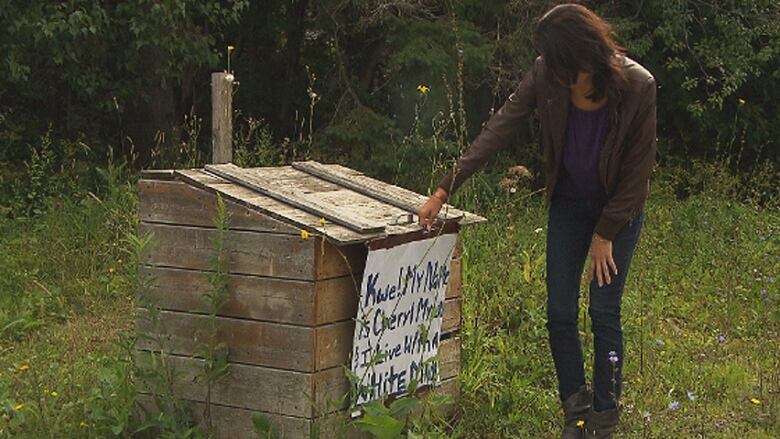Mohawk Cheryl Diabo faces eviction threat from Kahnawake
'My name is Cheryl and I live with a white man' sign left on Diabo's property by anonymous person
Cheryl Diabo, a Mohawk born and raised in Kahnawake, saysshe is being targeted for living on-reserve with her white boyfriendamidsta growing "marry out, stay out" sentiment in the aboriginal community on Montreal's south shore.
She came home one day to find a sign attached to the garbage bin outside her property that read, "Kwe! My name is Cheryl and I live with a WHITE MAN."
She said it's the latest in efforts to intimidate her, after several incidents in which her house and car wereegged.
Watch the video for more from Alison Northcott'sinterview with Cheryl Diabo
Diabo spoke with CBC reporter Alison Northcott on Thursday evening about her struggle in the face of a push to remove non-natives from the Mohawk territory.
She said she had her boyfriend of five years signa legal disclaimer drafted by a lawyer, statingthat he understood and respected Mohawk traditions. The letter was signed by a Mohawk witness and was notarized.
She said she also took the time to educate him on Mohawk customs and the way of life in Kahnawkebefore he moved into her house on the reservewhere she lives with one of her two children.
Now faced with the possibility of being evicted for living with a non-native, she says the thought of being forced to choose between her boyfriend and the land she has inherited from her great-uncle and father is awful.
Diabo said she doesn't know what she will do if she has to choose.
Before she invited her boyfriend to move in with her, she said she took her case to the Longhouse the traditional leadership in the Mohawk community.
"Idid ask them to discuss this matter becausethis is our jurisdiction, and I think now is the time more than ever to assert it. Families are being broken apart," Diabo said.

Intimidation techniques
In 1981, theKahnawakeMohawk Council imposed a moratorium banning mixed marriages and prohibiting non-natives from living on the territory even if they were married to a Mohawk from the community.
Hurting families and children and being exclusionary is not our way and its teaching our children to be bullies.- Cheryl Diabo, KahnawakeMohawk
The council and supporters of the moratorium have compiled a list of those considered to be in breach of that membership law.
Diabosaid she isnumber three on that list.
She said the first draft of the list, which has not yet been released, named 70 people. She said she was recently told the list now numbers more than 200.
Diabo said the sign and the eggings are just the tip of the iceberg when it comes to intimidation tactics being employed. by supporters of the moratorium.She said a friend of hers was involved in a tense altercation, and she said that a heated online discussion on Facebook has become violent in tone.
This kind of behaviour is setting the wrong example forKahnawake's children, she said.
"Hurting families and children and being exclusionary is not our way, and its teaching our children to be bullies," Diabo said.
She said the push to preserve the 1981 moratorium fails to reflect the realities of Kahnawake in 2014.
"In the long run, were looking ahead of us to say, this is our community. We have the right to live and raise our children amongst our people so that they can continue to learn and value our customs and our traditions and to have a world view that comes from [our native people] and not have it disrupted by Canadas world view, where we have a clash because our ways are different," she said.
On Thursday, Grand Chief MichaelDelisle said enforcing the "marry out, stay out" rule is not about excluding non-native people, but rather it is about preserving Mohawk lineage.
All we are trying to do is preserve, not only culture and language and identity, but who we are as a people. Those days of incorporating others into our society, I won't say [are] over, but [they need] to be controlled by us, and not by outside entities, Delisle said.
Diabo said some of the people who find themselves on the eviction list have been meeting to discuss the situation and propose alternatives.













_(720p).jpg)


 OFFICIAL HD MUSIC VIDEO.jpg)
.jpg)



























































































